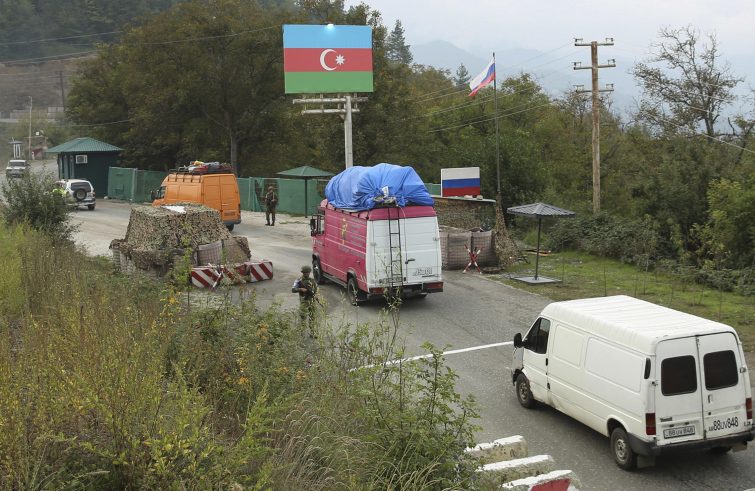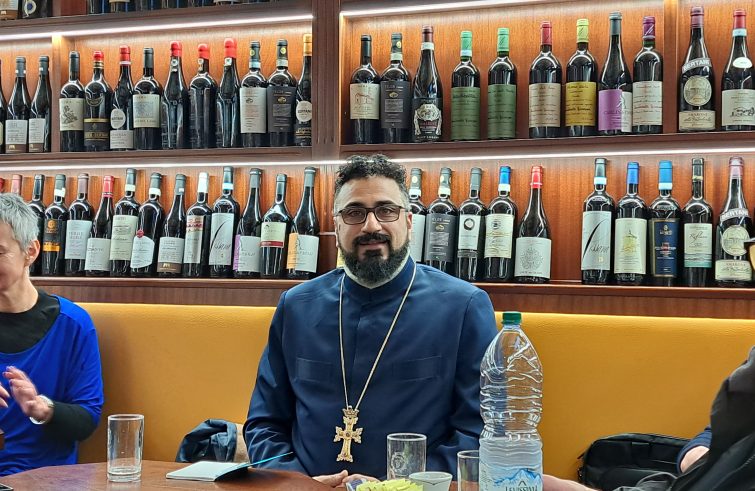
More than 100,000 Armenians, including 30,000 children, have been displaced from Nagorno-Karabakh. They left everything behind. They were forced to flee within 24/48 hours after a months-long siege, without water or food, without being able to take any belongings with them. Some fled by car, others by truck. “The soldiers broke into their houses. They plundered and pillaged everything. They even destroyed the ecclesiastical, spiritual and cultural heritage of the Armenian people. They destroyed churches, monuments and cemeteries.” “This is nothing but hatred: hatred of everything that Armenia stands for. And nobody talks about it.”
“The world must end this. No interest is more important than justice. Remaining silent is downright unjust”.

Speaking at a meeting for journalists in Rome organised by the ISCOM Association of the Pontifical University of the Holy Cross, Father Tirayr Hakobyan, Archimandrite of the Armenian Apostolic Church in Western Europe, gave voice to the suffering of the Armenian Christian people and drew attention to the grave humanitarian crisis caused by the conflict in the Nagorno-Karabakh region. The Nagorno-Karabakh conflict increasingly resembles a “political game” played out by the United States, Russia, Europe and Turkey, on the skin of the 100,000 people – men, women, children and the elderly – who have been forced to leave their homeland and seek refuge in Armenia. “Once they arrive in Armenia – said the Archimandrite – they receive a small contribution from the Armenian government, but it is a temporary situation. These people will have to find a job, start a new life from scratch. There is a sense of hopelessness in their eyes. We have lost everything, they say. So we have to help them not only materially, but also by providing them with psychological support.
The children who have been forced to flee, torn from their homes and their daily lives, are of the greatest concern. Many families, hoping to return to their homes in the future, have decided to settle in areas close to the border.
The archimandrite immediately made it clear that the “conflict” is not linked to religious, but to territorial motivations, since it aims at dispossessing the people of their land and wiping out a long-established presence. This is why they are targeting and attacking churches and cemeteries, historical monuments. They erased all references to Armenian culture and heritage. They even attacked and destroyed the Cathedral of the Holy Saviour Ghazanchetsots in the city of Shushi, a symbolic site of Armenian Christianity dating back to the 19th century. Father Hakobyan made a heartfelt appeal: “Save our heritage and our churches! They are an integral part of who we are.” Religion has always been “a fundamental part of Armenian identity.” The country has historically been a land of passage and borders, but the Church has kept Armenian identity and culture intact and strong. To target it today is tantamount to erasing the history and existence of a people.”
“The world rightly condemned Russia for invading an independent country. Now that Azerbaijan has done the same to the Armenians, the world remains silent, saying it’s just fine,” the archimandrite remarked. “Where is the truth? What interests are behind this repression of justice?”
It’s a complex scenario. Turkey and Iran are occupied with the war in the Middle East. Russia is concerned with consolidating and securing its gas and oil route to Europe. “What does Armenia have?” asks Father Hakobyan. “Nothing but its identity and its history.” “We have been left alone.” Only Pope Francis has spoken out about this in no uncertain terms. In his address to members of the Diplomatic Corps accredited to the Holy See on 8 January, the Holy Father made the latest – and much appreciated – appeal. “It is urgent that a solution be found to the dramatic humanitarian situation of those living in that region – the Pope said – while favouring the return of refugees to their own homes in legality and security and with respect for the places of worship of the different religious confessions present there. These steps will contribute to the building of a climate of trust between the two countries, in view of the much desired peace”. The Archimandrite repeated his words today: “The world,” he said, “cannot remain silent in the face of what is happening and obscure the truth. Justice must not be hijacked by vested interests. This silence will only make wars more threatening, but at that point no one will be able to stop them.”








